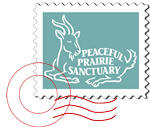 We called her Sweetie. We don't know what she called herself but, to us humans, she evoked the tenderness, vulnerability, innocence and wonder exuded by those we feel compelled to cradle with terms of reassurance and endearment. Sweetie was one of the 700 chickens rescued from the wreckage of a massive Mississippi "broiler" farm destroyed by Hurricane Katrina. When she and 200 other rescued chickens arrived at Peaceful Prairie Sanctuary last fall, they were barely 8 weeks old, still peeping in their baby voices, not even old enough to cluck. Yet their bodies were already huge and soon to be crippled by the abnormally large size that all "broiler" chickens are genetically manipulated to develop in less than two months - long before they reach adulthood - in order to reach what the industry calls "slaughter weight".
We called her Sweetie. We don't know what she called herself but, to us humans, she evoked the tenderness, vulnerability, innocence and wonder exuded by those we feel compelled to cradle with terms of reassurance and endearment. Sweetie was one of the 700 chickens rescued from the wreckage of a massive Mississippi "broiler" farm destroyed by Hurricane Katrina. When she and 200 other rescued chickens arrived at Peaceful Prairie Sanctuary last fall, they were barely 8 weeks old, still peeping in their baby voices, not even old enough to cluck. Yet their bodies were already huge and soon to be crippled by the abnormally large size that all "broiler" chickens are genetically manipulated to develop in less than two months - long before they reach adulthood - in order to reach what the industry calls "slaughter weight".A few months later, Sweetie's legs became too weak to support her enormous body. She started to limp, she staggered, she started to fall, so we moved her from the hen house to the human house where we could keep a closer watch on her. For weeks, our presence terrified her and she'd hide under the desk every time one of us walked into the room. We respected her need for distance and were careful not to intrude in her "personal space". Sweetie kept herself at what she considered to be a safe distance, and we were all getting used to the new routine.
One afternoon, as I sat down at my desk, I felt a gentle pecking and tugging at my legs. I thought it was Phoebe who had been a house hen for months and rarely missed a chance to socialize. But Pheobe was resting in her nest across the room.
I looked down and there was Sweetie preening the loose fibers dangling from my skirt. I sat motionless, not wanting to startle her. She went on with her grooming offering. After a while, I slowly extended my arm and touched her back. She did not run away as before, so I gently scooped her up and cradled her lumbering body in my lap. At first, she tensed up, darted alarmed glances around the room, made sounds of worry - but she did not try to get away. She just sat there and probingly stared at my face for what seemed like hours. Then, in a heartbeat, she relaxed and fell asleep in my arms.
This is the kind of gift that makes you want to weep - the trust of a completely vulnerable being. And the unshakeable, and devastating knowledge that this small, helpless, battered being, whose life isn't worth more than a dime to the industry, is someone who is full of mind, full of soul, full of important questions - "if I trust you, will you hurt me?" - and full of the yearning to not only love, but to be loved.
So much so that she is willing to risk her life to experience it.
Joanna Lucas
© 2006 Joanna Lucas
________________________________________
If living ethically is important to you, please remember that there is nothing humane about “humane” animal farming, just as there is nothing ethical or defensible about consuming its products. When confronted with the fundamental injustice inherent in all animal agriculture—a system that is predicated on inflicting massive, intentional and unnecessary suffering and death on billions of sentient individuals—the only ethical response is to strive to end it, by becoming vegan, not to regulate it by supporting “improved” methods of producing dairy, eggs, meat, wool, leather, silk, honey, and other animal products. For more information, please read The Humane Farming Myth. Live vegan and educate others to do the same.

<< Home